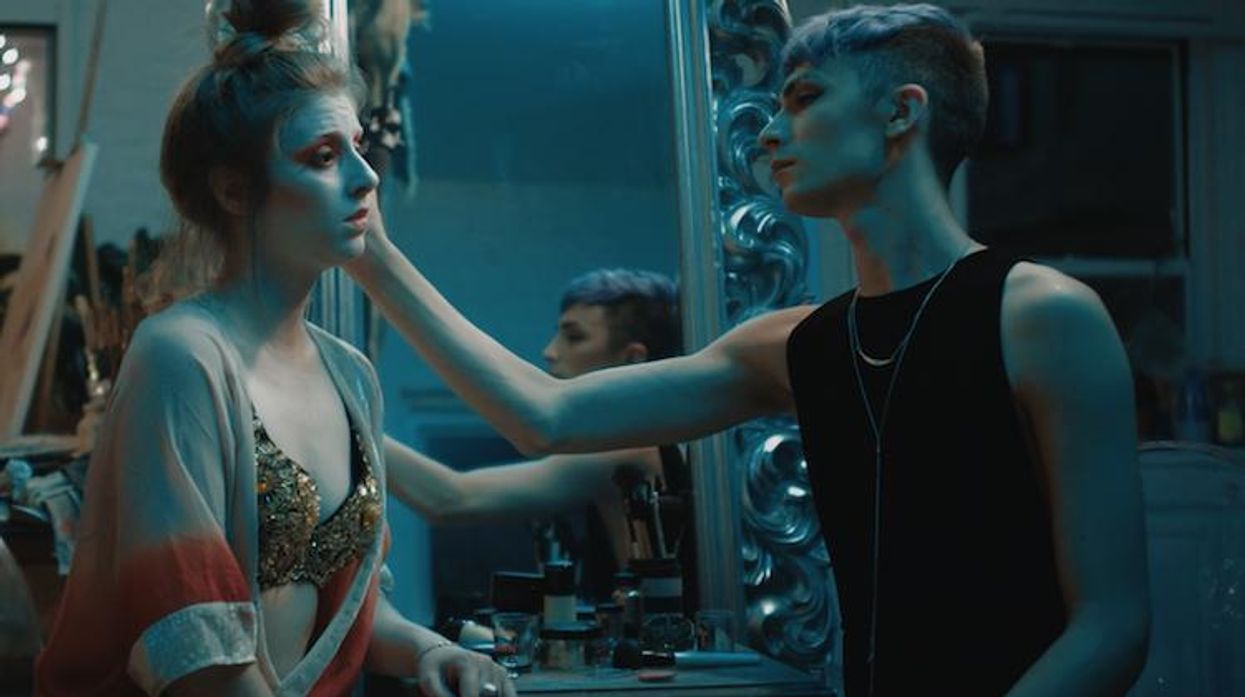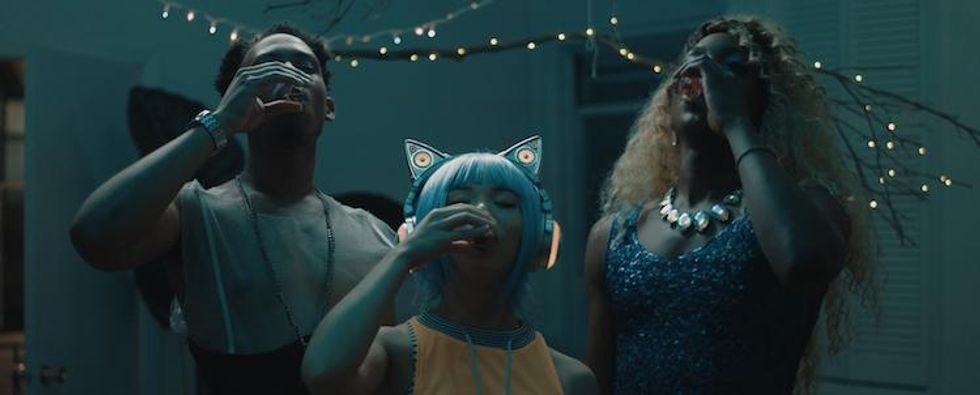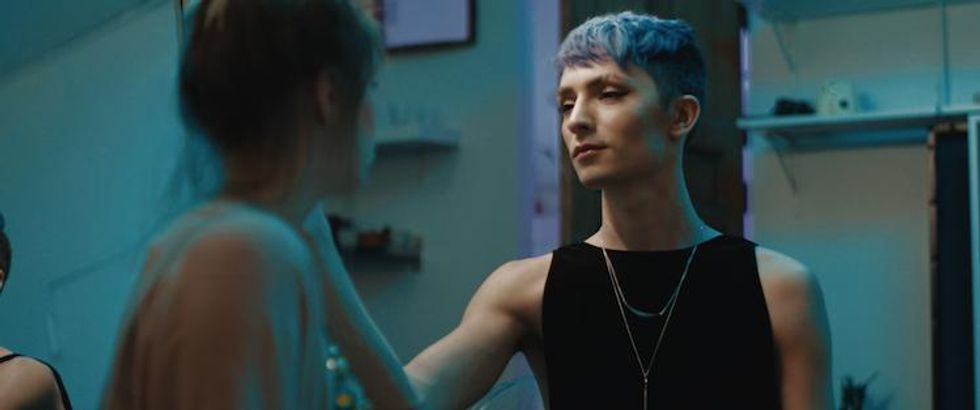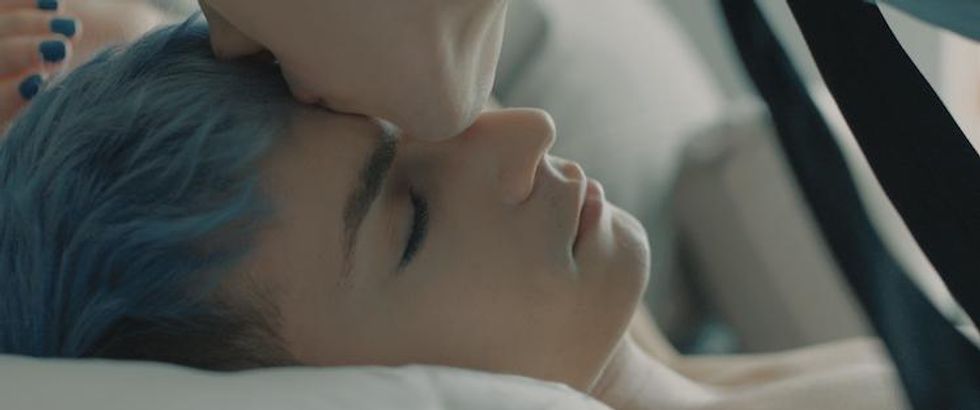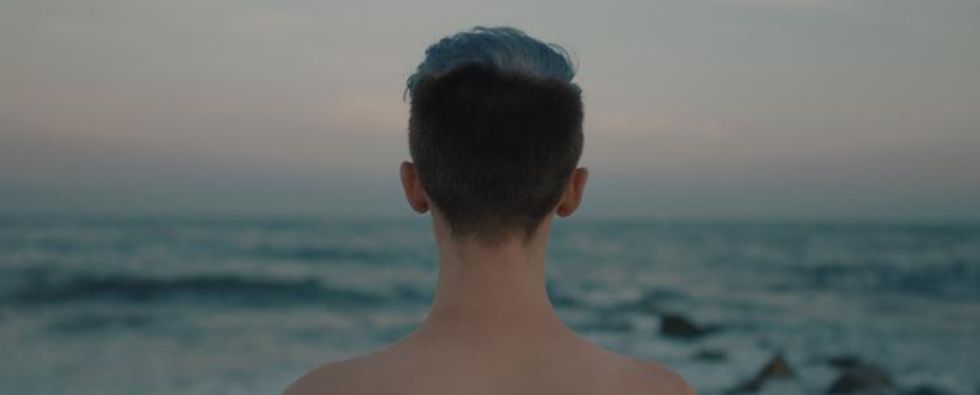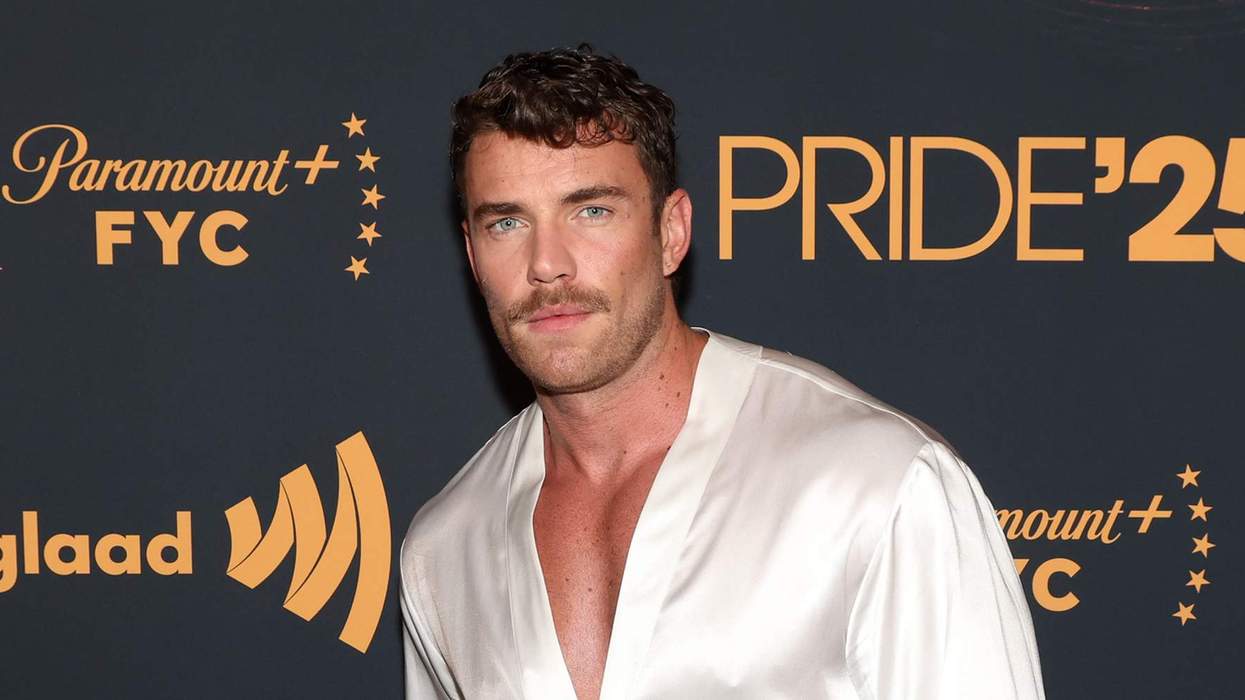Like Glass is as beautiful and crisp as a clear pane of glass. The short film's colorful, brisk visuals perfectly capture the intricate scenes of nightlife as it follows a club kid exploring their identity and dealing with an unsupportive boyfriend. Playing with themes of fragility, utopia, and gender, Like Glass considers rifts within the LGBTQ+ community through its queer characters.
We sat down with David Elijah, the writer-producer, Jesse James Keitel, and Magdalena Borlando, two of the stars, to talk about metaphors and the paradise of nightlife.
Related | Sarah Hudson's Songs From The Sea Short Film is a Spiritual Acid Trip
OUT: How did Like Glass come about? Where did the idea come from?
David Elijah: I went to college with these guys at Pace University, we were all students there, and after I was out of college, Jesse and Magdalena started to explore the nightclub scene. They started using their identities as performance art themselves. As a friend of theirs, I was coming out with them and seeing this transformation that they were both going through and I found it really fascinating. That's where the seed of the idea came from, just seeing how people could express something very inward, like identity, and very close to their heart, in a very outward and expressive and visual way. To me, that's what film is all about, using visual expression to talk about introspective things. It seemed like the perfect thing to put in the medium of film, and I knew that this was what these guys were actually going through. I had about 15 pages of the script at the time and this was the summer before last, and I called up Jesse and said, "do you want to sit down and have a lunch and can I show you this part of the script that I'd be interested in you playing the lead role in?" It was an outside perspective of maybe what someone like Jesse might be going through, and we sat down and read the script. Jesse was like, "you've written--" well, maybe I'll let Jesse talk about that.
Jesse James Keitel: Yeah, it was a little scarily close to my actual lived experience and things I had been going through at the time. How I related to my own identity and how I explored that through nightlife and how people close to me responded to that as well. It hit very close to home.
DE: And then from there it was maybe half of a plotline and it was mostly the central conflict between Zion and Luke, his boyfriend, and then we expanded it from there and kept having... It was kind of a workshop play process, because I would have these guys over to my apartment and we'd read through it and talk about the themes and the characters. This was really early on, when it was just the three of us involved. Then after that, once I had a script that was actually shootable, that's when I reached out to Lauren, who became my business partner and started Little Blondie Films with me. Andrew and Chris at StoneStreet Cinema was our director/production team. The script even changed through shooting and editing as it always does, but these guys were really the core creative team with me. It came from seeing their lives change and them blossom as people.
You were talking about how you use visual cues to talk about more introspective things, I wanted to talk about the costuming. I think it's absolutely gorgeous. Did you all put together those looks and style yourselves?
JJK: In terms of the overall looks, I think they were pretty inspired by how we dress ourselves in nightlife. Magdalena can speak to it too, she always wears stilts out.
Magdalena Borlando: It was definitely a collaboration of both Jesse and I's characters as well as these separate people that we were playing in this film. I wore the stilts in the film, too, because I thought that would be an important visual element. We were showing what was happening in nightlife but trying to create a separate character as well. Overall, it was definitely a collaboration of the creative team and what we were doing at the time.
DE: The interesting thing about a film like this is that it is such an essential aspect to the film, presentation is such a huge theme in the film because it's about gender identity and how you present, but weirdly enough, we didn't have a costume design or wardrobe supervisor on this. It was still a very small team. For a film that has so much to do with that, to not have that role was only possible because all of the actors came in with ideas and the ability to take cues from the script. The costume that Zion wears in the nightclub scenes was described in the script as "a dark phoenix" look. I wanted to have the theme of rebirth and all of that. Jesse and the director, Andrew K. Meyer, and I were able to sit down with that as a script cue and then turn it into something tangible and accomplishable. That's what these guys do. That's where these characters came from, these people that are already thinking in that way. Then, after that, it became getting an idea of all of these looks, but also having the freedom of having the actors show up on set with their own pieces of clothing, their own articles, their own ideas to put into it and kind of play while we're on set. We decide what the final thing is going to be when we shoot it, it's not like we had a very specific costume plot for those sorts of looks. We were also very fortunate to have lots of people from the club kid and drag community come in and just come with these brilliant, fully realized looks just as themselves and as their own nightlife personas. When we filled that nightclub with extras who are people who do this for fun on the weekends all the time, and also as a job some of the time, they were able to come in and do the work for us, which was amazing. It gave the film so much texture and life.
It's very real, yeah. I wanted to talk about the gender identity and presentation piece a little bit, there's a lot of fear of femininity even within the queer community. For example, you'll see on Grindr "no femmes" or whatever. Do you think people like Zion, who are maybe presenting more femme, are becoming more accepted?
JJK: I think it's a double-edged sword, I think with visibility for queer, trans, and gender-nonconforming people, I think a lot of opportunity is presenting itself. Also, a lot of danger is also appearing as well. With more acceptance comes more backlash as well. I think in my own personal journey that I explored through nightlife, I grew an immense amount of self-love that while was celebrated, also left me dragged down a bit by a lot of the people in my life.
Yeah. Within my lens and in my viewing of the movie, I thought the title was very fitting and spoke to the movie's treatment of the fragility of relationships, the human form, and gender in general. Is that what you intended?
DE: Yeah, the title came out of the monologue that Magdalena's character speaks pretty early on in the film, as Zion is touching up her makeup... Before we started the film, I had some other title. I don't remember, it was something silly, but I wanted to find something else and I like to pull titles from the scripts if I can because it's a good way to ground a metaphor. That's what I ended up doing, pulling it from the monologue where the sea, in her dream, looks like glass. Yeah, you hit it on the head with the metaphor where glass looks like one thing, but it actually is something else. It looks like a solid, but it's really a liquid, and it's elusive and it changes form even when we can't see it. It's really a metaphor about identity. You can't define things by how they look always. It's much deeper than that. That metaphor in itself has grown even for me, and when I watch the film back now, I find more things in it that I didn't really know were there. Everyone is fixated on "who am I? What is my identity? How do I have to look to match that?" And all of those things where you lose sight of the people around you and trying to make the world around you the best that it can be, which goes back to the monologue and speaks to exactly what she's talking about, being in this place that's pretty good, where we're all pretty accepted, but really, there are still conflicts under the surface there that we're not talking about or aren't getting resolved. They keep people from really living their true, happy lives. When Zion actually, in his mind, supersedes that and finds that place, it turns out that it's very lonely and he's not able to bring everyone else there with him yet. The real question of the film becomes, "is finding your perfect place worth it if you can't have everybody else there with you?" Can we individually get to these utopias? As a community, can we create this utopia if its underground, under the cover of darkness? That's also a problem, if it's not out in the daylight and with the people we love that are a part of our lives. Our parents, our boyfriends, all of them. It's all kind of in that title, I think.
And that place that Zi gets to, that's the island, right?
DE: Yeah, the perfect beach that Sarin knows she could get to in her dream, but can't because no one will follow her there.
Right. Magdalena, let's talk about that scream. That was the most beautiful, terrifying image I've seen in a while. What were you thinking, what were you invoking when you were filming that?
MB: I think it's a lot of the desperation and anger we feel towards getting towards this place that David was just talking about, we see this a lot also in nightlife. I think the club was a parallel to the beach, we go out and we dress up and we try to create this perfect place for us, but there are a lot of things that aren't like that. It's either not a safe space or you're not with anyone you know or people you love, you just gotta lose yourself and try to create this perfect place that you can find. I think desperation is definitely the best word to describe that. I'm yelling, screaming at Luke, who's someone who is not accepting, won't even try to come to this place with us. When I try to get some of the people I love to come out in nightlife with me, they absolutely will not, they won't talk about it, they want nothing to do with it, they actually look down upon it. It is sort of frustrating, trying to get someone to see a part of yourself.
Why do you think they look down upon it?
MB: I think because it's foreign and it's scary to them. They feel uncomfortable, whether it's in expressing themselves or, at the end of the day, because it's in a nightclub. It's under the cover of not and sometimes not the most positive things happen at night. I think it's either not feeling comfortable with the club they're going into or something within themselves because they don't feel comfortable. I have a friend who is female and straight, and she said the reason that she doesn't want to come out with me is because she feels like she's imposing on a territory that's not hers. She's stepping into a zone she doesn't belong in. It's sort of not... I mean, I understand her frustration, but the whole point is that everyone is supposed to be allowed. Queer, anybody is welcome. That can be frustrating sometimes.
DE: I think what we see now too-- or at least what I'm seeing-- is that these idyllic spaces can create a rift because you have communities that feel like they're not accepted there because they don't fit into the mold of bold and brash and wanting to be a little bit dangerous. Maybe they just want to go dance with shirtless guys all night or whatever it is, which is fine. There are so many ways to be queer, there are so many ways for that to be part of your truth. I understand that not every queer person is going to want to go out nightclubbing. I think that's part of what we're exploring in the film too, the nuances that happen and these rifts between community members. You have the heteronormative gay man, embodied by Luke, and the more queer, genderfluid person, embodied by Zion, and they don't always mix well. You see that at these clubs, you see it at certain queer parties even now, where sometimes it feels like those two communities are coming together and actually clashing in this space that is supposed to be a space for everybody. It comes out of a fear of not being accepted, from both sides. I think that's something we all wish we could deal with more and talk about more and get past so we can all just have fun together.
Is that sort of what you hope viewers get out of seeing Like Glass?
DE: Yeah, I think what I would really hope this movie gives to people is that they ask themselves questions about their own identity and where that comes from. If they're comfortable in it, if they're happy in it. Like, truly happy with it. Or if there's maybe something else that they feel they've always wanted to explore or haven't explored in any way. I think it's also just a film about listening to people around you and trying to accept them. There are these conflicts in our lives, and it feels like, "I'm right and I'm being attacked for the way I feel," no matter what side you're on. I feel like there's a lot of that in all of our lives and the best thing we can do is take a step back and try to see it from another person's perspective. I guess that's what I want people to be taking away from this.
JJK: One thing I think... I would want people to love their journey. I think it's easy to listen to other people being scared of what you're going through, which is sort of what Magdalena was saying before. Your journey may be very foreign to someone you love and they may not respond the way you were hoping they would.
MB: I guess for me, especially over time, I would want people to be more gentle with each other. I think the scene where Jesse comes back in after being assaulted... Every time you see someone, whether they're your friend or not, you don't know what they have just or maybe before have gone through, I think New York City is harsh enough, especially for queer people, that we don't need each other to...
JJK: We're on the same team.
MB: We're on the same team. Don't perpetuate that harshness, there's sort of a culture or theme of cut-off or "savage," I guess is what people say now, of being stone-cold or strong--
JJK: But there's strength in vulnerability, too.
MB: Yeah, absolutely. I think if more people had the relationship that Zion and Sarin had, we would have a much easier time finding ourselves...
JJK: And letting other people find themselves.
MB: Yeah. And letting people in.


